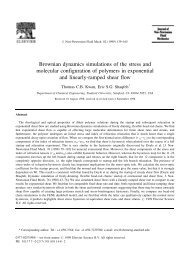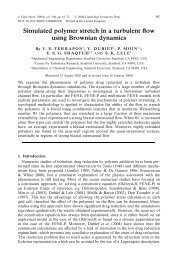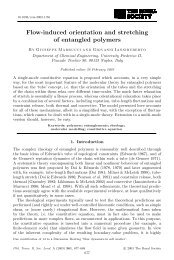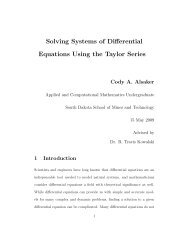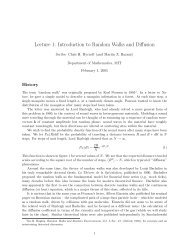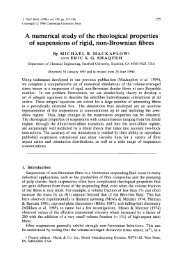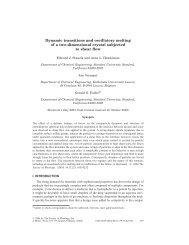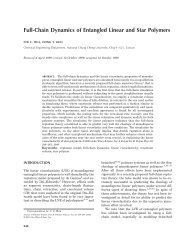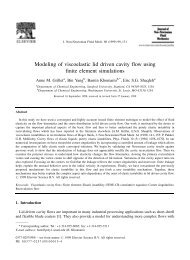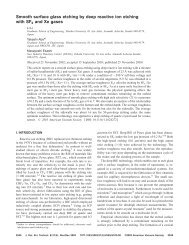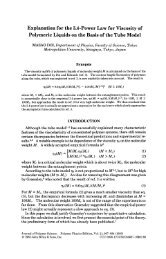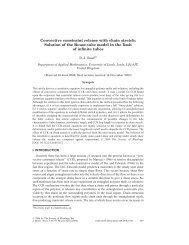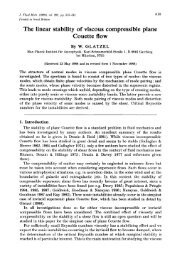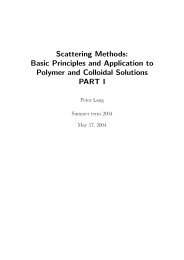Molecular modelling of entangled polymer fluids under flow The ...
Molecular modelling of entangled polymer fluids under flow The ...
Molecular modelling of entangled polymer fluids under flow The ...
Create successful ePaper yourself
Turn your PDF publications into a flip-book with our unique Google optimized e-Paper software.
2.4. CHAIN STRETCH AND CONSTRAINT RELEASE 35<br />
Here c/N is the <strong>polymer</strong> chain concentration.<br />
obtained from<br />
S(q) =<br />
∫ Z ∫ Z<br />
0<br />
0<br />
⎛<br />
exp ⎝− ∑ α,β<br />
q α q β<br />
2<br />
∫ s ′ ∫ s ′<br />
s<br />
s<br />
〈 ∂Rα (s 1 )<br />
∂s<br />
<strong>The</strong> single chain structure factor is<br />
⎞<br />
〉<br />
∂R β (s 2 )<br />
∂s ′ ds 1 ds 2<br />
⎠ dsds ′ . (2.40)<br />
〈 〉<br />
Equations 2.39 and 2.40 show that a knowledge <strong>of</strong> the function f αβ(s,s ′ ) = ∂Rα(s) ∂R β (s ′ )<br />
∂s ∂s ′<br />
is sufficient to evaluate both the stress and the single chain structure factor. By taking<br />
suitable averages <strong>of</strong> equation 2.36 a deterministic PDE for f<br />
≈<br />
(s, s ′ ) can be obtained. In<br />
deriving an expression for f αβ(s,s ′ ) the following closure approximation is necessary.<br />
〈R α (s, t)R β (s ′ , t)λ(t)〉 ≈ λ(t)〈R α (s, t)R β (s ′ , t)〉. (2.41)<br />
Milner et al. (2001) verified this approximation by direct stochastic simulation <strong>of</strong> equation<br />
2.36 and found it to be valid whenever strong CCR is present. <strong>The</strong> resulting PDE<br />
for f (s, s ′ ) is then solved by converting to a Fourier sine series.<br />
≈<br />
2.4.2 Comments on the MMcL model<br />
<strong>The</strong> MMcL model is significant in that it demonstrated that a full Rouse-like treatment<br />
<strong>of</strong> constraint release is sufficient to produce a monotonically increasing steady<br />
state shear stress as a function <strong>of</strong> shear rate. This was achieved without needing to<br />
include chain stretch, something which had not been managed previously with simpler<br />
implementations <strong>of</strong> CCR. If c ν > 0.07 this theory predicts that all linear <strong>polymer</strong>s<br />
have no shear banding instability regardless <strong>of</strong> the number <strong>of</strong> entanglements. However,<br />
a quantitative comparison <strong>of</strong> this theory with non-linear shear experiments is difficult.<br />
In experimental studies, the large build up <strong>of</strong> normal stresses <strong>under</strong> shear limits<br />
the range <strong>of</strong> shear rates. <strong>The</strong> usual resolution is to perform experiments on <strong>entangled</strong><br />
solutions which have lower absolute stresses in comparison with equivalent melts.<br />
To achieve <strong>entangled</strong> solutions very high molecular weight <strong>polymer</strong>s are used. <strong>The</strong><br />
maximum molecular weight which can be used is limited by the ability to synthesise<br />
monodisperse samples in sufficient quantities. Thus the number <strong>of</strong> entanglements in<br />
the measured systems is not huge. For examples <strong>of</strong> these studies see Menezes (1980),<br />
Menezes and Graessley (1982) or Bercea et al. (1993). In this case the window <strong>of</strong> shear<br />
rates which are simultaneously non-linear and non-stretching is very small. <strong>The</strong> effect<br />
<strong>of</strong> CLF and thermal constraint release make the range smaller still. This indicates the<br />
need to add chain stretch to the theory.<br />
Another significant assumption <strong>of</strong> the model is that the system can be described<br />
by a single constraint release time. This is valid for the window <strong>of</strong> <strong>flow</strong> rates to which<br />
the MMcL theory pertains since the simulations <strong>of</strong> Milner et al. (2001) confirm that all



